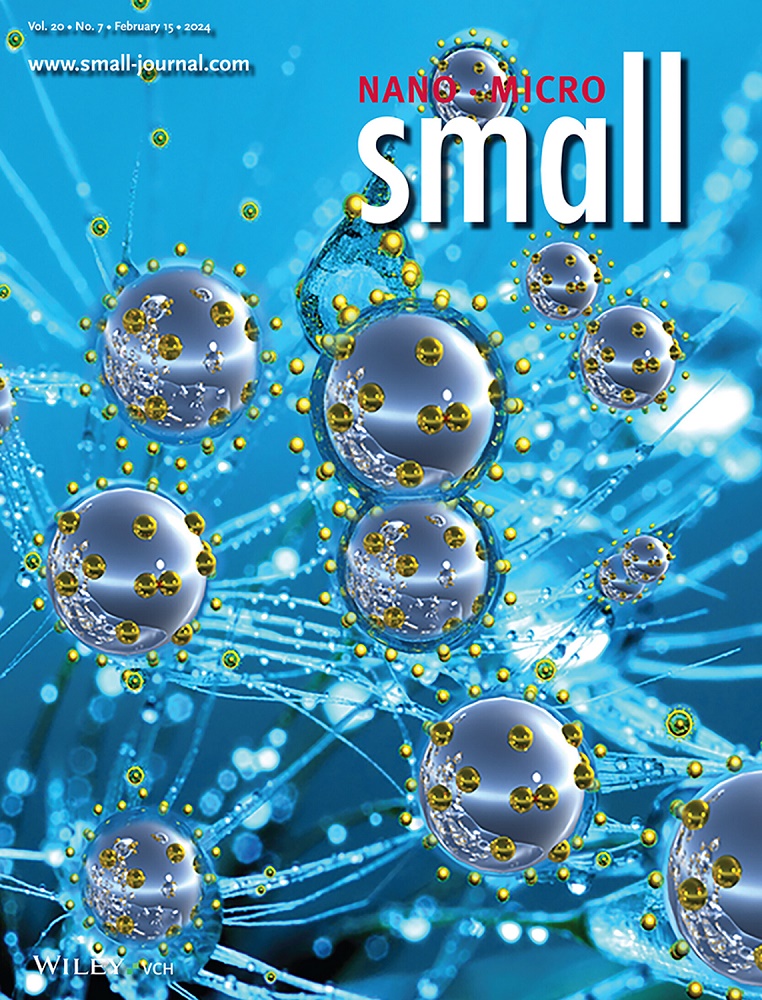Site‐Selective Biofunctionalization of 3D Microstructures Via Direct Ink Writing
IF 13
2区 材料科学
Q1 CHEMISTRY, MULTIDISCIPLINARY
引用次数: 0
Abstract
Two‐photon lithography has revolutionized multi‐photon 3D laser printing, enabling precise fabrication of micro‐ and nanoscale structures. Despite many advancements, challenges still persist, particularly in biofunctionalization of 3D microstructures. This study introduces a novel approach combining two‐photon lithography with scanning probe lithography for post‐functionalization of 3D microstructures overcoming limitations in achieving spatially controlled biomolecule distribution. The method utilizes a diverse range of biomolecule inks, including phospholipids, and two different proteins, introducing high spatial resolution and distinct functionalization on separate areas of the same microstructure. The surfaces of 3D microstructures are treated using bovine serum albumin and/or 3‐(Glycidyloxypropyl)trimethoxysilane (GPTMS) to enhance ink retention. The study further demonstrates different strategies to create binding sites for cells by integrating different biomolecules, showcasing the potential for customized 3D cell microenvironments. Specific cell adhesion onto functionalized 3D microscaffolds is demonstrated, which paves the way for diverse applications in tissue engineering, biointerfacing with electronic devices and biomimetic modeling.通过直接写墨实现三维微结构的位点选择性生物功能化
双光子光刻技术为多光子三维激光打印带来了革命性的变化,使微米级和纳米级结构的精确制造成为可能。尽管取得了许多进步,但挑战依然存在,尤其是在三维微结构的生物功能化方面。本研究介绍了一种结合双光子光刻和扫描探针光刻的新方法,用于三维微结构的后功能化,克服了实现空间可控生物分子分布的局限性。该方法采用了多种生物大分子墨水,包括磷脂和两种不同的蛋白质,在同一微结构的不同区域引入了高空间分辨率和不同的功能化。三维微结构的表面使用牛血清白蛋白和/或 3-(缩水甘油氧丙基)三甲氧基硅烷 (GPTMS) 进行处理,以增强油墨的保留性。该研究进一步展示了通过整合不同生物分子来创建细胞结合位点的不同策略,展示了定制三维细胞微环境的潜力。研究证明了细胞在功能化三维显微支架上的特异性粘附,为组织工程、与电子设备的生物界面和仿生建模等领域的多样化应用铺平了道路。
本文章由计算机程序翻译,如有差异,请以英文原文为准。
求助全文
约1分钟内获得全文
求助全文
来源期刊

Small
工程技术-材料科学:综合
CiteScore
17.70
自引率
3.80%
发文量
1830
审稿时长
2.1 months
期刊介绍:
Small serves as an exceptional platform for both experimental and theoretical studies in fundamental and applied interdisciplinary research at the nano- and microscale. The journal offers a compelling mix of peer-reviewed Research Articles, Reviews, Perspectives, and Comments.
With a remarkable 2022 Journal Impact Factor of 13.3 (Journal Citation Reports from Clarivate Analytics, 2023), Small remains among the top multidisciplinary journals, covering a wide range of topics at the interface of materials science, chemistry, physics, engineering, medicine, and biology.
Small's readership includes biochemists, biologists, biomedical scientists, chemists, engineers, information technologists, materials scientists, physicists, and theoreticians alike.
文献相关原料
| 公司名称 | 产品信息 | 采购帮参考价格 |
|---|
 求助内容:
求助内容: 应助结果提醒方式:
应助结果提醒方式:


